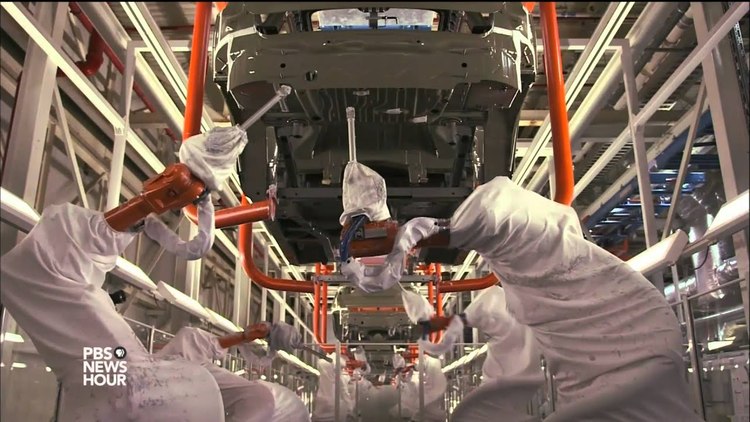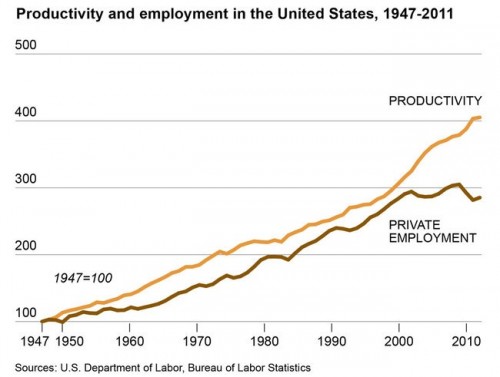


05/22/2015
The PBS Newshour had a segment on the automation threat to jobs this week, a good sign that the workplace revolution is becoming more widely recognized and discussed.
On the down side, I’ve seen almost no debate of how the economy is supposed to work when human workers are rapidly becoming obsolete, from strawberry pickers to financial analysts. Business will have far fewer shoppers to buy their machine-produced goods when millions of citizens no longer have paychecks.
Also, few have noticed that additional immigrants are totally superfluous when smart machines are taking over employment like gangbusters. Unskilled foreigners will mostly end up in the permanent underclass where many will engage in crime and welfare use.
But Senator Jeff Sessions is paying attention, and he wrote critically in an April 9 Washington Post op-ed, America needs to curb immigration flows:
Yet each year, the United States adds another million mostly low-wage permanent legal immigrants who can work, draw benefits and become voting citizens. Legal immigration is the primary source of low-wage immigration into the United States. In other words, as a matter of federal policy — which can be adjusted at any time — millions of low-wage foreign workers are legally made available to substitute for higher-paid Americans.
This federal policy continues at a time when robotics and computerization are slashing demand for workers. One Oxford University professor estimates that as many as half of all jobs will be automated in 20?years. We don’t have enough jobs for our lower-skilled workers now. What sense does it make to bring in millions more?
We already see the automation problem emerging in the jobless recovery, where productivity and jobs no longer track together, as shown in the chart below:

The PBS segment wasnt bad, and helpfully includes a brief clip of Martin Ford, author of the new book Rise of the Robots: Technology and the Threat of a Jobless Future. However the piece is marred by the formulaic denial of the revolutionary nature of workplace changes, with assertions that the technology will also give rise to new employment opportunities: true, but the numbers don’t work. The new jobs won’t begin to make up for the millions lost to the machines, which are getting smarter, cheaper and more dexterous.
Will your job get outsourced to a robot?, PBS Newshour, May 20, 2015
TRANSCRIPT
GWEN IFILL: Have you ever worried you might lose your job to a robot? I have.
Hari Sreenivasan finds it could well happen with advances in artificial intelligence, or A.I., transforming the work force.
That’s the latest report in our series on invention and innovation, Breakthroughs.
MAN: Oh, all in?
HARI SREENIVASAN: In a closely watched brains vs. artificial intelligence poker match held in Pittsburgh earlier this month, humans pulled off a slim win over a computer program called Claudico.
MAN: All right. Good job.
MAN: Good game, guys. Good game.
MAN: Good game.
HARI SREENIVASAN: Tuomas Sandholm, a computer scientist at Carnegie Mellon University, created the algorithms that run Claudico’s A.I.
TUOMAS SANDHOLM, Carnegie Mellon University: Those algorithms figure out how you should act strategically, how do you avoid or deal with humans trying to deceive you, and how do you deceive humans?
HARI SREENIVASAN: Sandholm predicts Claudico will be able to beat its human opponents within one to five years, much to the chagrin of Bjorn Li, the leading poker player in this tournament.
BJORN LI: When that happens, poker will pretty much be dead.
HARI SREENIVASAN: But putting pro poker players out of work is not what Sandholm focuses all his time on. There are other things that Claudico can already do better than humans.
TUOMAS SANDHOLM: In my lab, we have developed an algorithm for solving the matching problem for the nationwide kidney exchange for 60 percent of the transplant centers in the U.S. And there, twice a week, our algorithms make the transplantation plan for the whole country without any manual intervention. When there is scarcity of organs, the A.I. is making those decisions in an optimal way.
HARI SREENIVASAN: Matching the right kidney to the right patient is one example of an algorithmic artificial intelligence. But there are much larger demonstrations hitting the road, quite literally.
Daimler has developed a prototype dubbed the Freightliner Inspiration Truck that’s being test-driven across Nevada. The hope is that computer-driven trucks can reduce the number of accidents. There are currently 5,000 fatalities a year involving trucks. Drivers would function more like pilots, overseeing computerized systems.
But it begs the question: What jobs will survive in a new economy driven by automation?
Remember Ken Jennings, the “Jeopardy” game show champion who lost to IBM’s Watson in 2011? He says the writing is on the wall. Here he is in a TEDx talk.
KEN JENNINGS: And I remember standing there behind the podium, as I could hear that little insectoid thumb. And you could hear that little tick, tick, tick, tick, tick, tick.
(LAUGHTER)
KEN JENNINGS: And I remember thinking, you know, this is it. I felt obsolete. I felt like a Detroit factory worker of the ’80s seeing a robot that could now do his job on the assembly line. And it was frigging demoralizing.
HARI SREENIVASAN: It’s not just quiz show contestants that are at risk. As more and more jobs are automated, Jennings’ experience could be a harbinger of things to come for American workers.
That’s the argument made in a new book, “Rise of the Robots: Technology and the Threat of a Jobless Future,” by Martin Ford.MARTIN FORD, Author, “Rise of the Robots”: Going forward, we may see automation kind of unfold in a top-heavy pattern, where a lot of the best jobs are the ones to get impacted. Lawyers, pharmacists, certain areas of medicine like pathology and radiology, any kind of white-collar job where you are sitting at a computer at a desk, well, the people who you might call office drones, those are going to be very susceptible to this.
HARI SREENIVASAN: And there could be major disruptions to the U.S. economy, says Daphne Koller. She’s an A.I. scientist, and also president of the massive online learning company Coursera.
DAPHNE KOLLER, Coursera: We are already starting to see jobs that were thought of as intelligent being outsourced to computers.
So, for example, a large part of a paralegal’s job, which is hunting down the relevant references for a particular problem, is something that you would have thought requires intelligence. And now there are pretty good software systems that do not 100 percent of a paralegal’s job, but 80 to 90 percent.
HARI SREENIVASAN: Will artificial intelligence software do to the paralegal what the tractor did to the farmer?
DAPHNE KOLLER: It is quite likely that that will happen. And I think that there will be entire job categories that will go away.
HARI SREENIVASAN: We humans have always been resilient. With each industrial revolution, we have adapted, creating new jobs with new technologies.
DAPHNE KOLLER: The optimistic perspective is that this will happen here, and that the jobs that will be created will by nature be higher and more cognitively interesting jobs that are beyond the spectrum of what an artificial intelligence program can do.
HARI SREENIVASAN: Leaving the less interesting jobs to robotic helpers like Botlr, an automated bellhop who cruises the halls of this Aloft Hotel. Is that such a bad thing?
Stuart Russell, who directs the A.I. lab at the University of California at Berkeley, doesn’t think so.
STUART RUSSELL, University of California, Berkeley: Some people think that, inevitably, every robot that does any task is a bad thing for the human race, because it could be taking a job away.
But that isn’t necessarily true. You can also think of the robot as making a person more productive and enabling people to do things that are currently economically infeasible. But a person plus a robot or a fleet of robots could do things that would be really useful.
HARI SREENIVASAN: A perhaps simple example, cleaning up graffiti.
STUART RUSSELL: In many, many cities, the graffiti is just left because it’s too expensive. But if I had a team of robots that I could take around the city with me and point them to what needed to be cleaned up, I could get 10 times as much done. And there will be positions for graffiti-cleaning supervisors, which didn’t exist before.
HARI SREENIVASAN: Graffiti-cleaning supervising robots might exist in the future, but our economy is already evolving. There are plenty of jobs that didn’t exist 10 years ago that are now in high demand in fields like digital marketing and data analysis.
In fact, according to McKinsey & Company, the United States faces a shortage of data analysts. Almost 190,000 people are needed to analyze and understand big data. But will those jobs ultimately be filled by people or by deep learning machines?
Deep learning is a new type of A.I. that relies on neural networks. They’re computer programs modeled after the human brain and nervous system.
MAN: Hey, guys. How’s the training page looking?
HARI SREENIVASAN: At the Palo Alto office of MetaMind, engineers are using the technology to help computers see by quickly identifying images and placing them in categories.
The software can also understand nuance in the written word.
Richard Socher is co-founder and CTO. He says the technology will aid humans, not replace them.
RICHARD SOCHER, MetaMind: If you can bring the intelligence of the smartest people in a field, instill it in an algorithm with deep learning, you could really help a lot of people.
HARI SREENIVASAN: One example, he says, is in the field of medicine.
RICHARD SOCHER: If the best doctors in the world train an algorithm to find various different problems in C.T. scans or in X-rays, mammograms, for instance, you could build an algorithm that is almost as good as the best doctors in the world.
A human can only look at so many mammograms in their lifetime. An algorithm could look at millions and millions, and eventually find subtle things that may have not even been that obvious to the human eye.
HARI SREENIVASAN: So, how will society adapt to a computer intelligence that can do work which, until now, only humans could?
DAPHNE KOLLER: What people have going for them that computers as of yet don’t is the incredible adaptability of the human mind, the ability to learn new skills, the ability to really adapt to unexpected situations.
And so what we really need to do is to help people become even better at that.
HARI SREENIVASAN: Just like in a poker game, we don’t know what the outcome will be. We humans are raising the stakes as we continue to drive advances in A.I. technology. So, it will be up to us to stay at the table.
For the PBS NewsHour, I’m Hari Sreenivasan.
JUDY WOODRUFF: And you can watch more stories from our Thinking Machines series on our Web site, PBS.org/NewsHour.